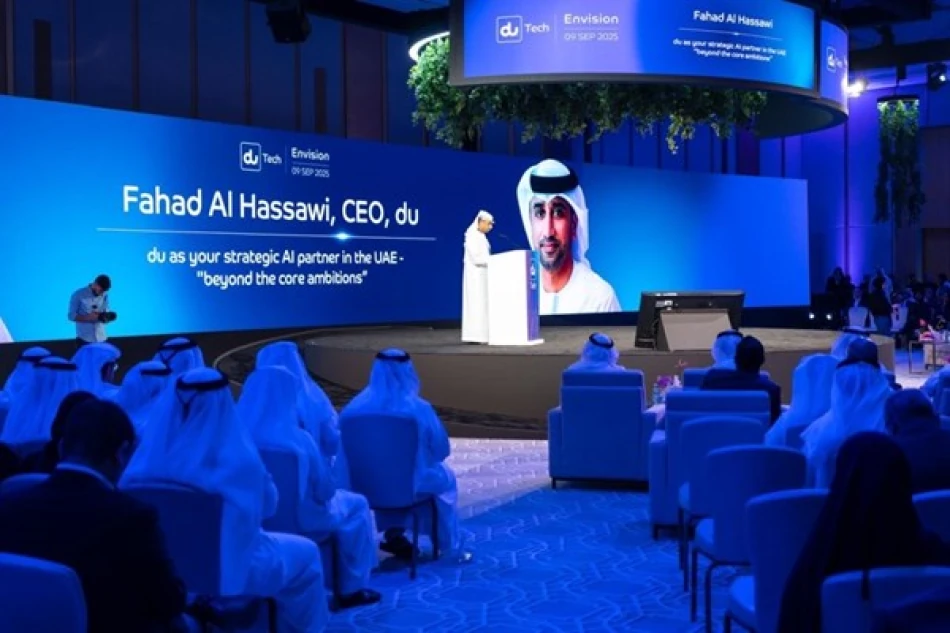
du Concludes the Third Edition of 'Infocomm 2025', Showcasing Technology Innovations
UAE Positions Itself as Global AI Powerhouse Through Strategic Tech Summit
The UAE is making a bold statement in the global artificial intelligence race, hosting its third annual Envision 2025 summit in Dubai with unprecedented participation from tech giants including Oracle, IBM, Microsoft, and Huawei. The event signals the Emirates' serious commitment to building AI-driven economic infrastructure that could rival Singapore's fintech dominance and China's manufacturing automation success.
Strategic Focus on AI Sovereignty
This year's summit, organized by telecommunications provider du, brought together over 500 global participants and 26 senior executives to discuss five critical pillars of digital transformation. The emphasis on sovereign cloud computing and national data sovereignty reflects a growing global trend where nations seek to control their digital infrastructure rather than rely entirely on foreign tech giants.
Fahad Al Hassawi, CEO of du, positioned the event as more than a conference—it's a strategic platform for shaping the UAE's digital future. The focus on "Agentic AI" applications and advanced robotics suggests the country is preparing for the next wave of automation that could transform everything from logistics to healthcare.
Learning from Global AI Strategies
The UAE's approach mirrors successful models from other tech-forward nations. Singapore's emphasis on fintech innovation and Estonia's digital governance have shown how smaller countries can punch above their weight in technology adoption. The Emirates appears to be applying similar focused strategies to AI and cloud computing.
Corporate Investment Signals Market Confidence
The presence of heavyweight executives from Oracle's Middle East division, IBM's regional leadership, and Microsoft's UAE operations indicates serious corporate investment in the region. Randi Zuckerberg's keynote participation adds Silicon Valley credibility to the UAE's AI ambitions, suggesting international recognition of the country's potential as a regional tech hub.
For investors and multinational corporations, this represents a clear signal that the UAE is building the infrastructure necessary to support advanced AI applications across industries including healthcare, education, smart cities, and transportation.
Fourth Industrial Revolution Applications
The summit's focus on robotics and Industry 4.0 technologies positions the UAE to capitalize on the next phase of global manufacturing evolution. As companies worldwide seek to reduce supply chain vulnerabilities exposed during recent global disruptions, the UAE's strategic location between Europe, Asia, and Africa makes it an attractive hub for AI-powered manufacturing and logistics.
Implications for Regional Competition
The UAE's AI strategy puts pressure on regional competitors, particularly Saudi Arabia's NEOM project and Qatar's National Vision 2030. The Emirates' advantage lies in its established business infrastructure and regulatory environment that has already attracted global financial services and logistics companies.
The emphasis on sovereign data centers and cloud infrastructure also addresses growing concerns about data security and national digital independence—issues that have become increasingly important as geopolitical tensions affect global technology supply chains.
Market Opportunities and Challenges
For technology companies, the UAE's AI push creates opportunities in enterprise software, cloud services, and specialized AI applications. However, success will require understanding local regulatory requirements and cultural considerations that differ from Western markets.
The focus on practical AI applications across multiple sectors—rather than just flashy consumer technologies—suggests a mature approach that could deliver measurable economic benefits. This pragmatic strategy increases the likelihood of sustained investment and development rather than speculative bubble formation.
Building Sustainable Digital Communities
The summit's emphasis on sustainability alongside technological advancement reflects global recognition that AI development must consider environmental impact. The UAE's significant solar energy investments position it well to power energy-intensive AI computing while maintaining environmental commitments.
By combining AI development with sustainable infrastructure, the UAE is positioning itself for long-term competitiveness as environmental regulations increasingly affect technology deployment globally. This integrated approach could become a model for other nations seeking to balance technological advancement with environmental responsibility.
Most Viewed News

 Layla Al Mansoori
Layla Al Mansoori






